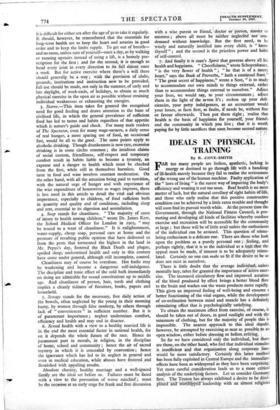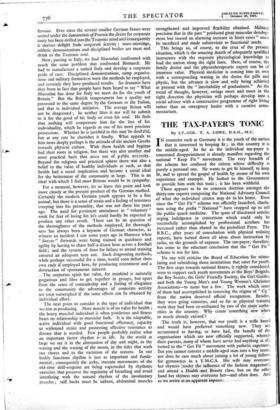IDEALS IN PHYSICAL TRAINING
By R. .COVE-SMITH
FAR too many people are listless, apathetic, lacking in energy or destined to go through life with a handicap of ill-health merely because they fail to realise the seriousness of the wrong use of the human machine. Faulty application of the " laws of living " is the surest way of impairing the body's efficiency and wearing it out too soon. Real health is no mere matter of luck, but the natural corollary of right habits of _life, and those who early realise that this positive constructive condition can be achieved by a little extra trouble and thought will soon find its pursuit worth while. At the present time the Government, through the National Fitness Council, is pro- moting and developing all kinds of facilities whereby outdoor exercise and recreation will be accessible for the community at large ; but these will be of little avail unless the enthusiasm of the individual can be aroused. This question of stimu- lating enthusiasm is a delicate one. There are those who look upon the problem as a purely personal one ; feeling, and perhaps rightly, that it is to the individual as a unit that the appeal must be made, if interest is to be adequately stimu- lated. Certainly no one can make us fit if the desire to be so does not exist in ourselves.
There is little doubt that the average individual, unless mentally lazy, takes for granted the importance ofactive exer- cise. The increased circulatory flow and improved aeration of the blood produced by effort brings a better blood flow to the brain and washes out the waste products more rapidly. This gives an improved feeling of well-being and ensures a better functioning of the vital organs, while the development of co-ordination between mind and muscle has a definitely stimulating effect that is psychologically satisfying.
To obtain the maximum effect from exercise, of course, it should be taken out of doors, in good sunlight and with the minimum of clothing, but for the majority of people this is impossible. The nearest approach to this ideal should, however, be attempted by exercising as near as possible to an open window, either before dressing or before. retiring. So far we have considered only the individual, but there are those, on thenther hand, who feel that individual stimulus is insufficient and that organisation along corporate lines would be more satisfactory. Certainly this latter method has been fully exploited in Central Europe and the . immediate effects have been as widespread as they have been surprising. Yet more careful consideration leads us to a more critical analysis of the underlying factors. Let us consider Germany first. The Teuton has always exhibited a desire to be disci- plined adcr Wriifiliip'pecT leadership with an almost religious fervour. Ever since the several smaller German States were united under the domination of Prussia the desire for corporate unity has been drilled into he Teutonic mind and 'Zonsequen-tly it derives delight frcirit -corporate activity ; mass-meetings, athletic demonstrations and disciplined bodies are meat and drink to the Teutonic soul.
Now, passing to Italy, we find Mussolini confronted with much the same problem that confronted Bismarck. He had to manufacture a united Italy and develop a corporate pride of race. Disciplined demonstrations, camp organisa- tions and military formations were the methods he employed, and certainly they have produced results. So dramatic have they been in fact that people have been heard to say " What Mussolini has done for Italy we must do for the youth of Britain." But the British temperament has a quality not possessed to the same degree by the German or the Italian, and that is individual initiative. The average Briton will not be dragooned ; he neither likes it nor will he submit to it for the good of his body or even his soul. • He feels that nothing will compensate him for the ' loss of his individuality, which he regards as one of his most precious possessions. Whether he is justified in this may be doutiful, but at any rate he cherishes it fondly. What appeals to him more deeply perhaps is the attitude of the ancient Greeks towards physical culture. With them health and hygiene had their roots in religion, but there was also another and more practical basis that arose out of public necessity. Beyond the religious and practical sphere there was also a belief in the value of healthy individuals as such, so that health had a social implication and became a social ideal for the betterment of the community at large. This is an ideal with which I feel most Britons would be in sympathy.
For a moment, however, let us leave this point and look more closely at the present product of the German method. Certainly the modern German youth appears to be a fine animal, but there is a sense of strain and a feeling of tenseness creeping into his personality, that was not there ten years ago. The need for persistent attendance at " voluntary " work for fear of losing his job could hardly be expected to produce any other result. There can be no question of the thoroughness of the methods employed, for thorough- ness has always been a keynote of German character, as witness an incident I saw some years ago in Hanover when " Soccer " forwards were being trained in quickness and agility by having to chase half-a-dozen hens across a football field ; and the system of fines for failure to attend training ensured an adequate turn out. Such dragooning methods, while perhaps successful for a time, would soon defeat their own ends if employed here, by producing resentment and a destruction of spontaneous interest.
. The corporate spirit has value, for mankind is naturally gregarious and likes to get together in groups, but apart from the sense of comradeship and a feeling of allegiance to the community the advantages of corporate activity are outweighed if the same effects can be obtained by individual effort.
The next point to consider is the type of individual that we aim at producing. Mere muscle is of no value for health ; the heavy muscled individual is often ponderous and fitness bears no relationship to muscular bulk. It is the adaptable, active individual with good functional efficiency, capacity to withstand strain and possessing effective resistance to disease that is needed. Few people probably realise what an important factor rhythm is. in life. In the world at large we see it in the alternation of day and night, in the waxing and the waning of the moon, in the tides that wash our shores and in the variation of the seasons. In our , bodily functions rhythm is just as important and funda- mental; consequently the jerky, staccato movements of the old-time drill-sergeant are being superseded by rhythmic exercises that preserve the regularity of breathing and avoid ' interfering with the natural rhythm of the involuntary muscles_; stiff backs must be unbent, abdominal muscles strengthened and improved flexibility obtained. Military precision that in the past " produced great muscular develop- ment but caused an alarming increase in heart cases," must be sacrificed and made subservient to functional needs.
This brings us, of course, to the crux of the present situation, which is the amazing dearth of adequately qualified instructors with the requisite physiological knowledge to lead the nation along the right lines. Here, of course, the family doctor and the physiotherapeutic expert can be of immense value. Physical medicine is coming into its own with a corresponding waning _ in the desire for pills and physic, but the advance is slow and only being achieved at present with the " inevitability of gradualness." As the trend of thought, however, swings more and more in the right direction the physician will perhaps develop into a social adviser with a constructive programme of right living rather than an emergency healer with a curative arma- mentarium.



























































 Previous page
Previous page